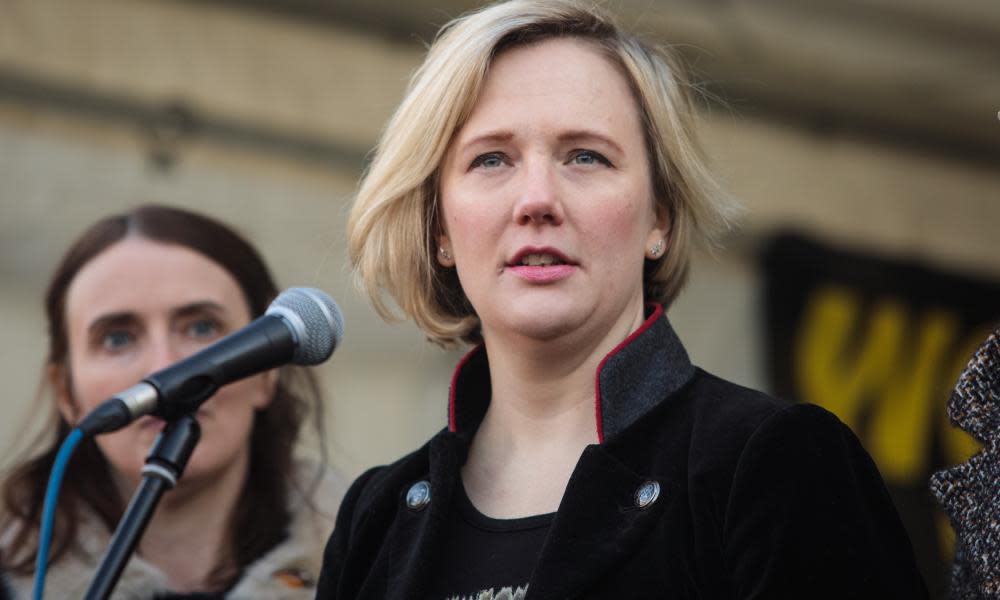Stella Creasy: MPs' standards authority does not recognise maternity leave

The Labour MP Stella Creasy has said she feels parliament is telling her to “choose between being a mum and being an MP”, revealing that the parliamentary standards authority has told expectant mothers it does not recognise any form of maternity leave and will not automatically provide extra support for constituency work after she gives birth.
Writing in the Guardian, Creasy said she had decided to speak out after experiencing two miscarriages during which she was forced to continue to work as normal without any additional support.
Related: I’m pregnant and forced to choose between being an MP and a mum | Stella Creasy
Now pregnant again, she said she had been told that MPs would not be provided with any additional funding for support staff by the Independent Parliamentary Standards Authority to allow her to get extra help with constituency work.
The MP for Walthamstow said she had been heartened by the introduction of proxy voting, introduced earlier this year after a the Labour MP Tulip Siddiq, who heavily pregnant, was forced to delay her caesarean section and vote in a wheelchair, but that far more had to change.
Creasy said that during her first miscarriage, she had carried on constituency work “aching and bleeding”, including joining a protest for the extradition of a man who had raped and murdered a constituent. After her second miscarriage she said she had to arrange the medical procedure around constituency advice surgeries.
“Heartbroken by all the years that I have struggled with fertility, I’ve kept these events to myself and made sure my constituents have never been affected,” she writes. “Now I’m pregnant once more and terrified – not just that it will go wrong again, but because I know that my resolve to keep my private and professional lives separate has become impossible.”
Creasy said she had approached Ipsa about funding for cover but was told it “does not ‘recognise’ that MPs go on maternity leave”.
“Humiliatingly, it is making me beg for extra staff funding – or give up any chance of spending time with my child to make sure my constituents don’t miss out,” she writes. “If a GP or vicar were on leave, a locum would be provided to ensure continuity of services. In Denmark, a member of the national parliament would have a substitute MP appointed.”
Siddiq, the MP for Hampstead and Kilburn, told the Guardian she had been refused extra help with her first pregnancy, a year after she arrived in parliament in 2015. Having given birth to her second child four months ago, she said she had not even bothered to make the application.
Related: MP who delayed birth of son accuses Tories over proxy vote delay
“That is because of the negative reaction I had first time around. They were utterly baffled I was even having a baby, I was passed around and I was told ‘we have not got a historic policy on that because we have not had many women in parliament who give birth’,” she said.
“It was painting a picture that MPs could only be men or older women. I don’t think it was meant to be malicious. I think it was genuinely something that had not been dealt with, but it is the most normal thing in the world, having a baby.”
Siddiq said she had carried on doing her constituency emails from her hospital bed, but had been supported in constituency events by Keir Starmer, whose constituency neighbours hers.
“He helped because we unofficially paired up, but that was the goodness of his heart. If you share a borough with an opposition MP, they wouldn’t do it,” she said.
“In a way, no one else can really do your job full-time. It’s a privilege to be an MP, but me doing any less is a real stress on my staff members and having any extra help to deal with casework and emails, which is 80% of the work, would make life so much easier in the first couple of months.”
She has continued doing advice surgeries and meetings straight after giving birth, but said proxy voting had vastly improved her experience after the birth of her son.
“It has made such a huge difference, not just to my mental health but my physical health, not having to travel to parliament for very late night votes,” she said.
Creasy said the struggle MPs experienced trying to take adequate maternity leave was one of many issues where fertility was still a barrier to equality, highlighting non-disclosure agreements used to cover up maternity discrimination and the postcode lottery of fertility treatments.
”Prejudices and unhelpful tropes about motherhood suffocate female representatives – whether we have children or not – in a way that is rarely true for our male counterparts,” she said.
“For my work on abortion rights I have been trolled relentlessly with the charge that it is my own childlessness that drives my ‘desire to kill other people’s babies’.”
Creasy said she had decided it was “time to stop asking nicely for the discrimination to be dealt with” but said she had found herself on the receiving end of a “bitter reminder that it’s still often men who will make the choices that determine if that battle will be won”.

 Yahoo News
Yahoo News 
